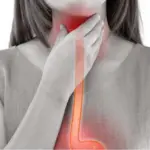Difficulty swallowing due to anxiety is an alert response from the body that affects the way swallowing is performed. It is usually temporary and symptoms may vary from person to person. The symptoms that arise must be addressed with precision and efficiency so that they do not alter other areas of life.
In this sense, anxiety and stress can have a significant impact on the digestive system and cause symptoms related to swallowing, such as a feeling of tightness in the throat or a sensation of having a lump in the throat. In this PsychologyFor article, we will provide you with information about the difficulty swallowing due to anxiety: causes, symptoms and treatment
What is dysphagia (difficulty swallowing) due to anxiety
Dysphagia is a medical term that refers to difficulty swallowing food, liquids, or even saliva. It can occur as a symptom of various medical conditions and factors, including structural problems in the esophagus, neuromuscular diseases, acid reflux, obstructions or anxiety, among others.
When a person is anxious, the body tends to go into a state of alert known as “fight or flight,” which can affect the way swallowing is performed. For example, some may feel that their throat is closed or tight, which makes normal swallowing difficult However, these symptoms are usually temporary and disappear once anxiety dysphagia subsides.
It is essential to keep in mind that any chronic or persistent problem related to swallowing, regardless of the cause, should be evaluated and treated by a health professional , such as a doctor or gastroenterology specialist. If you experience difficulty swallowing or any other concerning symptoms, it is essential to seek appropriate medical care for an accurate diagnosis and treatment.
Symptoms of difficulty swallowing due to anxiety
Difficulty swallowing caused by anxiety can manifest itself in a variety of ways, and symptoms can vary from person to person. Some of the most common manifestations that people with anxiety dysphagia may experience include:
- Feeling of tightness in the throat : It may feel as if there is a lump in the throat or as if the throat is closed, making it difficult to swallow normally.
- Feeling of suffocation or suffocation : Some people may find it difficult to breathe when swallowing due to tension and anxiety. In this article, we tell you what shortness of breath due to anxiety is like.
- Difficulty initiating swallowing : It may be difficult to initiate the swallowing process due to anxiety and stress affecting the muscles involved in swallowing.
- Fear of choking : People with swallowing-related anxiety may have an excessive fear of choking while eating or drinking.
- Need to swallow repeatedly : You may feel the need to swallow several times before the food or liquid passes completely.
- Feeling that food is stuck – You may experience the sensation of food or liquid getting stuck in your throat or chest, which can increase anxiety.
- Burning or heartburn sensation : Acid reflux, which can be exacerbated by anxiety, can cause a burning sensation or irritation in the throat and esophagus.
Causes of difficulty swallowing due to anxiety
Difficulty swallowing due to anxiety can have several causes, and it is important to keep in mind that symptoms can vary from person to person. Some of the most common causes of anxiety-related dysphagia include:
- Esophageal hypersensitivity : Anxiety can increase the sensitivity of the esophagus and throat, which can make the person more aware of swallowing and perceive that it is more difficult to swallow.
- Muscle spasms : Stress and anxiety can cause muscle tension in the throat and esophagus, which can interfere with the normal swallowing process.
- acid reflux : Anxiety can increase acid production in the stomach, which can lead to acid reflux. When stomach acid flows into the esophagus, it can irritate the throat and cause a tight feeling or difficulty swallowing.
- Syndrome of pharyngeal globus : also know as globus hystericus, refers to the persistent sensation of having a lump in the throat without an apparent physical cause. It is often related to anxiety and stress.
- Generalized anxiety disorders : People who suffer from anxiety disorders, such as generalized anxiety disorder (GAD), may experience physical symptoms, such as difficulty swallowing, as a result of chronic stress.
- Hyperventilation : In times of intense anxiety, some people may hyperventilate, breathing rapidly and shallowly. This can lead to a feeling of a lump in your throat or difficulty swallowing.
How to relieve difficulty swallowing due to anxiety
There are effective methods that have scientific support for this problem. If you are experiencing difficulty swallowing due to anxiety, here are some strategies that can help relieve your symptoms:
- Psychological therapy : Going to a mental health professional is effective in combating this discomfort. Cognitive behavioral therapy is a form of psychological therapy that has been shown to be effective in treating anxiety and its symptoms. It can help you change thinking patterns and behaviors that contribute to anxiety and dysphagia.
- Psychiatric medication : The consumption of anxiolytics reduces anxiety levels and allows the mind and muscles to relax. However, it is pertinent that the supply of this type of drugs be supervised by a clinical specialist.
- Relaxation techniques : Stress and anxiety can increase muscle tension in the throat and esophagus, making swallowing difficult. Practicing relaxation techniques, such as deep breathing, meditation, or yoga, can help reduce anxiety and relieve muscle tension.
- Eat slowly and chew your food well : Take your time to eat and chew food completely before swallowing. This can reduce the feeling of food getting stuck in your throat.

This article is merely informative, at PsychologyFor we do not have the power to make a diagnosis or recommend a treatment. We invite you to go to a psychologist to treat your particular case.
If you want to read more articles similar to Difficulty swallowing due to anxiety: causes, symptoms and treatment we recommend that you enter our Clinical Psychology category.
Bibliography
- Camarero González, E. (2009). Consequences and treatment of dysphagia. Hospital Nutrition Magazine, 2 (2), 66-78.
- Suárez-Escudero, JC, Rueda Vallejo, ZV, Orozco, AF (2017). Dysphagia and neurology: an unbreakable union? Colombian Neurological Act Magazine, 34 (1), 92-100.









